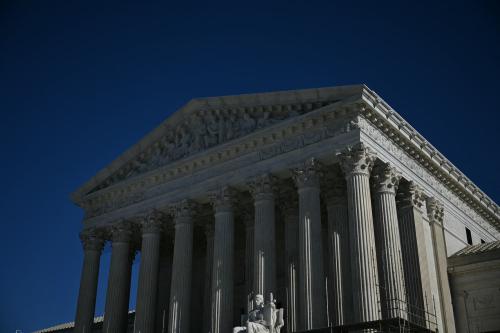A Quinnipiac University poll released this morning offers an intriguing X-ray of Iowa voters’ sentiments as they prepare to caucus this evening.
On the Republican side, Donald Trump leads Ted Cruz by 31 to 24 percent, with Rubio in third place with 17 percent. As I noted in a previous piece, if Trump comes out on top, it will be in large part because of Cruz’s failure to dominate among the group on which he has staked his campaign—white evangelical voters. According to Quinnipiac, Cruz enjoys the support of 30 percent of evangelicals, compared to 28 percent for Trump. By contrast, Cruz leads Trump by 50 to 29 percent among voters who identify themselves as members of the Tea Party, and by 43 to 25 percent among voters who think of themselves as “very conservative.” While Cruz does about equally well among voters with and without college degrees, Trump gets only 21 percent of college-educated Republicans who plan to caucus tonight, compared to 36 percent of non-college caucus-goers. Not surprising, Trump also leads Cruz by 31 to 22 percent among voters with annual incomes of less than $50,000.
Marco Rubio may well be the sleeper candidate in the race. Perhaps by default, he is doing very well among educated, upscale, and relatively moderate Republicans while gaining the support of one in six evangelicals. Although his overall share of the vote in the Quinnipiac survey is 17 percent, he is supported by 28 percent of moderate/liberal Iowa Republicans, by 24 percent with college degrees, and by 26 percent of those with annual incomes in excess of $100,000. This matters because fully 74 percent of college-educated likely caucus-goers have attended a previous caucus; this figure drops to only 48 percent among those without a college degree. Similarly, 64 percent of likely caucus-goers with incomes about $100,000 have previously attended a caucus, compared to 49 percent for likely attenders with incomes under $50,000. The bottom-line: Because previous behavior is typically the strongest indicator of future performance, Rubio voters are more likely than others to show up.
On the other hand, only 63 percent of Rubio voters are firmly committed to him, compared to 74 percent for Cruz and a remarkable 81 percent for Trump. By and large, then, the Trump supporters who show up tonight are very likely to stick with him when they cast their votes. And perhaps counterintuitively, the most moderate candidate (Rubio) and the most conservative candidate (Cruz) are going head-to-head for each other’s weakly committed voters. More Cruz supporters say that Rubio is their second choice than is any other candidate; more Rubio supporters say the same about Cruz. If Rubio surges tonight, as many Republican insiders suspect he will, at least a portion of his gains will come at Cruz’s expense.
On the Democratic side, the calculus is simpler. The Quinnipiac survey puts Bernie Sanders in front of Hillary Clinton by 49 to 46 percent, with O’Malley stuck at 3 percent. Consistent with previous polls, Sanders leads among very liberal Democrats, men (by a stunning two to one margin), and likely caucus-attenders without college degrees. Clinton about ties Sanders among somewhat liberal Democrats and enjoys a substantial lead among those who identify as moderate or conservative as well as those with college degrees. Sanders leads Clinton by 20 percentage points among Democrats with annual incomes below $50,000; Clinton leads Sanders by 12 points among Democrats who earn more than $100,000. Clinton leads by 71 to 24 percent among likely caucus-goes older than 65 and by 54 to 40 percent among voters ages 45 to 64. By contrast, Sanders dominates among younger voters by 74 to 23 percent.
62 percent of likely caucus-goers who have never attended before say they will support Sanders, but Clinton leads by 52 to 41 percent among those who have gone at least once before. As my colleague Elaine Kamarck noted yesterday, for Sanders it all comes down to turnout: will younger, downscale, less educated but highly energized liberal voters venture forth into the Iowa winter chill this evening? If they do, he could prevail.
Update: in a piece yesterday for the Atlantic, veteran political analyst Ron Brownstein offered a plausible explanation for Trump’s support among white evangelicals. The split among Republicans along the intertwined lines of class and education, he suggests, has also divided evangelicals. According to figures provided by Marist from its new state surveys, Cruz leads Trump by almost two to one among college-educated evangelicals but loses to Trump by 14 percentage points among evangelicals with less than a college education. In 2016’s distinctive political climate, class-based issues dominate the traditional evangelical concerns over social issues and personal conduct—at least among downscale evangelicals.
The Brookings Institution is committed to quality, independence, and impact.
We are supported by a diverse array of funders. In line with our values and policies, each Brookings publication represents the sole views of its author(s).




Commentary
New poll shows splits among Iowa voters
February 1, 2016